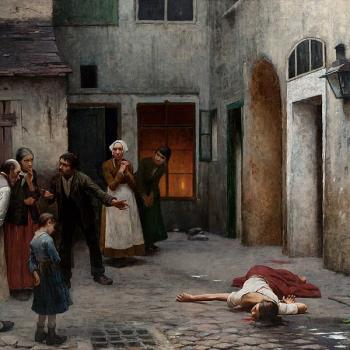
So, Pope Francis has written a soon-to-be-released encyclical on the environment.
Long before we got this close to actually reading the document itself, we’ve been treated to histrionics and “instructions” to the Holy Father to mind his own pontifical business.
Rush Limbaugh took time away from counting his money to come out against the encyclical he had not read. Predictably, he based his thinking on his own greed-is-good theology. Now, he’s running his jaws, flapping about a “leaked” version of the encyclical, which, for all we know, a Vatican janitor pulled out of the trash. Of course, Mr Limbaugh repeats his slanders about the pope being a “Marxist” while he’s doing this.
Presidential candidate Rick Santorum chimed in a few weeks ago, instructing Pope Francis to “back off” talking about climate change. His logic? The Church should steer away from scientific questions. According to Fox News, an unnamed blogger at First Things “accused the pope of promoting ‘theologized propaganda’ on conservation — a post the journal’s editor later disavowed.”
According to WMAL, the GOP is on the verge of doing battle with Pope Francis over climate change. USA Today has written an article stating what is obvious to anyone who understands politics: The opposition to this encyclical is about money.
In the meantime, environmentalists and liberals are tuning up for their happy dance. I have no doubt that their interpretations of the upcoming encyclical will be as self-serving and inaccurate as those of Mr Limbaugh, et al.
Every pope in recent memory has spoken out about the environment. Every pope in recent memory has taken a strong stand against the evils of corporatism, which is organized greed wedded to government power. Why is Pope Francis any different?
The answer to that is as obvious as the answer to why corporatists oppose him with such venom: People are listening to this pope. They’re paying attention to what he says. For the first time in a long time, ordinary people see the Church as accessible. Pope Francis is a father figure to billions of people who never listened to the Church before.
He has shifted the Church away from the appearance of partisan alliances and given it the old-time Gospel outlook of a Church that is beholden to no political party or faction. That is exactly as it should be. The Church should have one Master, one Lord, and that is Jesus Christ.
Contrary to what the nay-sayers are yapping about, Pope Francis is entirely within his purview when he addresses the environment. Human beings were explicitly told from the beginning that we have “dominion” over this earth. We were commanded to care for it as good husbandmen, to lead it to be fruitful and to bring forth its goodness for all humanity, for all time.
Corporatism is the antithesis of this. Corporatism is evil, and like all evil, it only destroys. Corporatism rapes the environment. Corporatism cuts down the rainforests, and plunders the wealth of the ground, all the while displacing people, shutting them into economic slavery and destroying both their hope and their future. Corporatism destroys life on a global scale; wiping out whole species of beings like mowing down grass.
Of course corporatism’s well-paid mouthpieces fear this pope and his message. Of course, they are enraged by the very thought of this upcoming encyclical.
All this presents the American bishops with an unsettling conundrum, one that, like most of their problems, is at least partly of their own making.
America’s Catholic bishops sit on shaky thrones. Their prophetic voice has been chipped and scarred by the clergy sex abuse scandal. Their authority and ability to teach is compromised by the refusal of priests in the parish to carry the message on critical issues such as the sanctity of marriage.
The bishops were forced to reach over the heads of their priests and go directly to the people in the pews in the matter of the HHS Mandate. It is to the everlasting credit of the pew-sitters that they found loyalty and support there in this critical fight for religious freedom.
Now, with this encyclical, they have to go in y0ur face with their most loyal followers. The civil religion, which worships at the altars of the R and the D, is divided cleanly along party lines. The Ds support abortion, backed the HHS Mandate and have fallen over backwards into gay marriage. The Rs have become the only home that faithful Catholics feel they have in the political sphere.
Given that the level of teaching at many of our parishes tends toward a Hallmark card Christianity that no longer addresses the lived reality of many of those in the pews, serious Catholics have been taking more and more of their “teaching” on theological matters from the Republican Party.
This was frankly encouraged by the original founders of the religious right such as Jerry Falwell. Rev Falwell, and most of his fellows, imposed their own political beliefs on the Gospels. They did this even when those political beliefs ran counter to what the Gospels themselves plainly said.
As a result, the religious right deified corporatism. The Catholic Church did not join in with this heresy. But the bishops and the parish priests did not oppose it in the kind of clear language that is necessary to teach the people in the pews. They failed, at a critical juncture, to effectively teach the constant teachings of the Church. These teachings go back in a straight line, from one pope to the next, for hundreds of years. But the people in the pews never got the message.
This created a vacuum where there should have been legitimate Christian teaching. This vacuum left the people in the pews to make up their own theology. Over time, they were seduced by the civil religion of party politics. Faithful Catholics in the pews came to substitute the civil religion for Christianity in matters concerning economics. They exchanged the teachings of right-wing corporatists for the constant teaching of the Church in economic matters.
Now they are hardened in this heresy. And the bishops stand hapless, unable to figure out how to set things right.
At the same time, “progressive” churches did their part by bastardizing the Gospels on issues life, marriage, gender identity and the sexualizing of women and children. Left and right, they both cut their religion to suit their politics. The political heresy reigned.
Nobody in the religious sphere, other than the popes themselves, was teaching the whole Gospel of Christ.
Now, after decades of this, we are reaping the whirlwind.
Part of the damage of that whirlwind is that the American bishops are now faced with teaching an encyclical in parishes where the most faithful of the parishioners have drunk so deeply of the Republican Kool-Aid that they actually place more trust in the likes of Rush Limbaugh than they do the Vicar of Christ. These are people who are dying for leadership. They want to be led. They’ve settled on following the teachings of their political party rather than the teachings of their Church.
I haven’t read the encyclical Pope Francis has written on the environment. But I do not doubt that it is based on the simple fact that humanity’s dominion over creation is a responsibility, and not just an opportunity for destructive exploitation by the few to the detriment of everyone else.
Pope Francis is Peter. Think carefully before you follow the R or the D instead of the Church created by Christ the Lord.
As for the American bishops, my heart goes out to them. They are in such a mess, and they don’t appear, most of them, to be up to the task in front of them.
One thing I know: We don’t need institutionalized “company” men, at this time. We need men of God.
From The New York Times:
… With Francis expected to make the case that climate change, unchecked development and overconsumption are exacerbating the suffering of the poor, advocates for the environment and the poor are thrilled.
But the leaders of the Catholic Church in the United States may be harder to win over. At the spring meeting of the United States Conference of Catholic Bishops here last week, bishops from around the country said they were withholding their enthusiasm until they saw the document on Thursday.
Some said they were wary about getting the church enmeshed in the debate over climate change, a contentious issue in the United States. They also expressed concern about allying with environmentalists, some of whom promote population control as a remedy, since the church sees abortion and contraception as great evils.
Some bishops said they had received hate mail from Catholics skeptical of climate change. That has added to the bishops’ hesitation and confusion on the topic.













